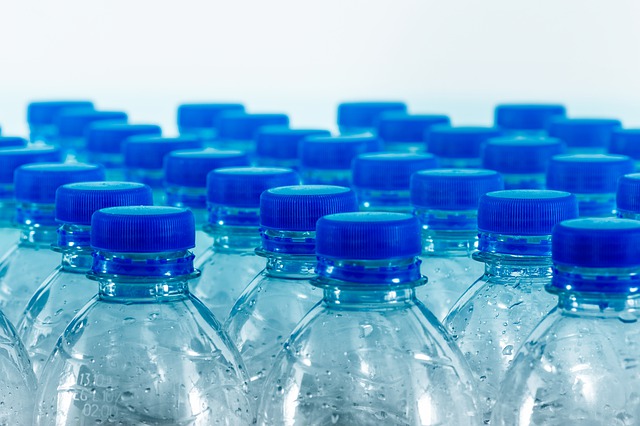Is Water Giving You Cavities?
The idea seems laughable. Water should be a neutral 7 on the pH scale of acidity and alkalinity. We drink it every day. We use it to rinse our mouths and brush our teeth. It should be helping to protect out teeth. But many sources of water may be acidic enough to damage tooth enamel. Read on and we’ll examine the pH level of several popular water sources. I’ll also tell you how you can neutralize the acid level of your water, and even make your own alkaline water.
A Quick Primer on the pH Scale
The pH scale measures the acidity or alkalinity of a substance. The middle of the scale is a 7. This is neutral—neither acid nor alkaline. Pure water is here. Substances that are acidic—like lemons, colas, and stomach acid—have lower pH levels. Alkaline substances—like baking soda, bleach, and ammonia—have higher numbers.
The pH scale is logarithmic. This means that every step along the scale is 10 times greater than the last step. A pH of 5 is 10 times more acidic than a pH of 6. A pH of 4 is 10 times more acidic than a pH of 5 and 100 times more acidic than a pH of 6. A Coca-Cola Classic (with a pH of 2.5) is over 10,000 times more acidic than a glass of whole milk (with a pH of 6.9). As you can see, things escalate rather quickly.
Tooth enamel starts to dissolve around 5.5 on the pH scale. Dentin, a substance beneath the enamel, starts to dissolve around 6.5. Dentin can be exposed at the gumline or through tooth wear. So if your teeth are perfectly healthy, you can tolerate a more acidic environment. But if you’re like most of us, you won’t want your teeth to spend significant time below a 6.5 on the pH scale.
Now let’s see how various water sources fall on the scale.
Water on the pH Scale1)”Analyzing & Comparing Brands of Bottled Water.” Alkaline Water Plus. Accessed July 27, 2019. jQuery('#footnote_plugin_tooltip_920525_1_1').tooltip({ tip: '#footnote_plugin_tooltip_text_920525_1_1', tipClass: 'footnote_tooltip', effect: 'fade', predelay: 0, fadeInSpeed: 200, delay: 400, fadeOutSpeed: 200, position: 'top right', relative: true, offset: [5, 5], });">https://www.alkalinewaterplus.com/analyzing-comparing-brands-of-bottled-water/.[/note]
Alkaline
- Essential: 9.0
- Real Water: 8.0
- Evamor: 8.0
- Music Mountain: 7.88
- Super Chill: 7.50
- Absopure: 7.5
- Zephyrchills: 7.5
- Fiji: 7.50
Safe
- Volvic: 7.0
- Eternal: 7.0
- Evian: 7.0
- Arrowhead: 6.83
Borderline Safe
- Gerber Pure Water: 6.5
- Smart Water: 6.5
- Great Value Walmart: 6.5
Harmful to Dentin
- Spring by Dannan: 6.40
- Deer Park: 6.3
- Dasani: 6.08
- Voss: 6.0
- Crystal Geyser: 6.0
- Ice Mountain: 6.0
- Sam’s Choice: 5.90
- Poland Spring: 5.8
- AquaFina: 5.67
- Great Value: 5.53
Harmful to Enamel
- Perrier: 5.50
- Deja Blue: 5.49
- Ozarka: 5.49
- Function: 5.0
- Dasani: 4.5
- Penta: 4.0
- Propel Fitness Water: 3.6
- Propel Zero—Gatorade: 3.5
- Dasani Lemon: 3.48
- Vitaminwater: 3.4
- Fruit ² O: 3.10
As it turns out, quite a few popular bottled waters are dangerously low on the pH scale. They’re so acidic that prolonged exposure could wear away tooth enamel and cause cavities.
Why would bottled water be acidic?
Bottled water can be acidic because of the source water it was taken from or because of the processes it went through before bottling. Some waters are intentionally acidified to prevent bacterial growth.
What about tap water?
Tap water varies from location to location, but is usually around the neutral range. You can test your tap water pH with tester strips, available online and at some health food stores. But even neutral pH tap water can contain fluoride and residual pharmaceuticals that pass through the treatment process.2)Doheny, Kathleen. “Drugs in Our Drinking Water?” WebMD. Accessed July 31, 2019. https://www.webmd.com/a-to-z-guides/features/drugs-in-our-drinking-water#1.
Alkalizing Your Own Water
Exposure to acidic foods and liquids at mealtimes is natural and not harmful. Many superfoods are very acidic. But you don’t want acid washing across your teeth throughout the day or as a final rinse before you go to bed. Yikes! So let’s neutralize those acids with some alkaline water.
You could buy alkalized bottled water or an expensive alkalizing filter. But why not just make it yourself? It’s super easy! Seriously! Unfortunately, there are a lot of myths and half-truths out there when it comes to making your own alkaline water. It’s time to separate the truths from the myths….
Myth: All Herbal Teas Are Alkaline
Many herbs teas (infusions) are alkaline, but many are also acidic or neutral. Nettles make an excellent alkaline tea, as does peppermint. But peppermint can also be acidic when made as a cold infusion. And rose hip tea is significantly acidic.
Herbal teas are a great way to support a heathy body. Many contain the vitamins and minerals that your body needs to maintain healthy teeth. Plus, they’re easy to absorb, unlike many supplements you buy in pill form.
Herbal teas will often have an overall alkalizing effect on the body. Alas, they are not necessarily alkaline in your mouth.
You May Also Like:
Discover the shockingly simple way to get real nutrition that will deeply nourish your body. (Seriously, this method is so easy—and effective—you’ll wonder why you’ve never heard of it before!) Click here to learn more!
Truth: Baking Soda Will Alkalize Water
Add a small amount of baking soda (usually around 1/2 teaspoon) to your water to neutralize its acid. Use pH strips to find the exact amount you’ll need. Some people drink baking soda water. Others find the taste off-putting. If you decide to drink it, you’ll want to monitor the pH level to make sure you don’t get too alkaline.
I prefer to swish the baking soda water around my mouth to wash food debris from my teeth, and to bring my mouth’s pH back up to a safe level after acid exposure.
Myth: Lemon Water Becomes Alkaline Overnight
Various websites will tell you that lemon water is alkaline. Some say that you need to slice the lemons, but not squeeze them, and then place them in water and cover them for 12 hours. Unfortunately, this is not true. Lemon may have a net alkalizing effect in the body once the acidic components have been metabolized, but lemons outside the body remain acidic.
I gave this method a try, just to be sure. According to my digital pH meter, my lemon water’s starting pH was 4.38. Twelve hours later, the pH had dropped to 3.52. It had become more acidic!
Truth: Boiled Water Is Alkaline
As water boils, it releases trapped gasses. Some of these, like carbon dioxide, are acidic. The result is that the water’s pH rises, becoming more alkaline. To retain maximum alkalinity after boiling, allow it to cool in an airtight bottle. Interaction with the atmosphere will gradually bring the pH back down.
The exact amount of change will vary according to the temperature of the water, the length of the boiling time, the mineral content of the water, and the original pH of the water. In my experiments, I was able to raise tap water from 7.5 to 9.06, and water purified by reverse osmosis from 5.53 to 8.39.
What Do You Think?
Do you know the pH of your water? Did you find yours on the list? Have you tried any of the alkalizing strategies listed above? Or do you know of any that we left out? Let us know in the comments.

Scott Sexton is a TGN Trailblazer, a highly experimental gardener, an unrelenting weed-eater, and a largely non-profit herbalist (much to his wife’s chagrin). When Scott is not teaching foraging classes, testing out theories in the garden, or grazing in the forest, he can be found at his Facebook page, “A Forager’s Guide to the Zombie Apocalypse.”












COMMENTS(2)
Plain Dasani is listed trice with a ph of 6.08 and 4.5 and I suspect there is something missing from one of those that is supposed to distinguish it from the other. Also regarding lemons, when the citric acid from a lemon meets the gastric acid in our stomach, the two acids react and become alkaline (one of the reasons lemon water soothes an upset stomach and nausea). I suspect someone got that confused with it being alkaline at some point along the way because there is no acid in the world that becomes alkaline by simply sitting out overnight. Overall, I enjoyed the article/info. The only bottled water I drink (and more importantly have my son drink) is Fiji water because it’s a good clean water with a good silica content. That dissolved silica is one of the only things that can pass through the blood-brian barrier, attach to metals and toxins and carry them out of the brain (mercury, lead, aluminium, etc.). There are other ways to get that silica like horsetail plant (in tea), or stinging nettles (eaten like steamed/boiled like spinach or in tea), but the Fiji water is better at adding to an organic fruit juice with adding unwanted flavors or just drinking as water.
Great article! Yes, there are a few on the lists that seem to be listed twice but maybe are something slightly different. What I was hoping to see on the lists and mentioned in the article was how the seltzer waters, carbonated waters, club soda waters and any others in those categories, whether flavored or not effect the teeth or any other health matter. These have become extremely popular but not easy to uncover any hidden negative features. I would also want to know if it makes a difference if they are in a metal can, in a plastic bottle or in a glass container–even if it’s different if they are made at home.